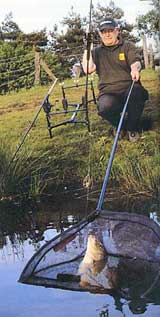This is what Rodney Wrest posted to the forum, headed ‘Intuition?’:
“After a day at a local stillwater a couple of friends and I were discussing bite indication and got onto the subject of getting in tune with the venue and predicting a bite. You know…….that feeling you get. It can be after hours or minutes on a venue when you get that calm wave wash over you and you turn your attention to a particular rod seconds before you see an indication, your hand is already hovering over the rod before the float dips or the buzzer beeps. What are your experiences of this phenomenon, do you think you can explain it? Is it a sixth sense we develop or something we unlock while relaxing on the bank?” Forum – ‘Intuition’.
|
|
| |
SIXTH SENSE – OR COMMON SENSE?
I had a book published in 1980 called ‘Advanced Coarse Fishing’ (A & C Black – now out of print) from which I’ll quote the following passage:
“There has been a lot of debate over the years as to whether some anglers possess a sixth sense; a kind of extra-sensory perception (ESP) that consistently successful anglers use to full advantage when it comes to choosing a swim. It is supposed that these fortunate anglers can look at a piece of water, which can be devoid of all character, and say exactly where the fish can be found. I do not know if ESP has anything to do with it, but I do know that I sometimes have a very strong urge to fish a certain swim that to all intents and purposes has no special feature that would normally attract me to it.”
|
|
| |
It was an ability, or sense, that warned us of impending danger, or told us that meat or fish were nearby; food that was out of sight, not making a sound, and that we couldn’t smell.
I know of other anglers, as well as myself, who have walked around a stillwater, a large, featureless piece of water, that they have never fished, and know next to nothing about, who have said they fancied a certain swim. From there they have, like all thorough anglers, done what they could to gain as much information as possible about the water. Where they could they scanned the water with sonar from a boat, or failing that, plumbed it quite extensively with float and plummet, or a timed leger drop. They have watched the water in the early morning or late evening, hoping to see fish, or signs of fish. And having done all that they have then fished an area where all the evidence has said they should fish. Sometimes they’ve failed, but most times they’ve been successful. But sooner or later they’ve been drawn back to that first swim they said they ‘fancied’, only to fish it with more success than they’ve had in any other swim on that water.
|
|
| |
And does it end there? If there is an iota of truth in what I believe, could it be possible that this sixth sense can detect not only the location of fish, but also if the fish are feeding or not?
There have been too many occasions when I, and other anglers I know, have spotted fish feeding off a certain bank, and yet chosen to fish the opposite bank where there have been no signs of fish, only to record a good catch, while those who fished the bank where the fish could be seen have caught very little. It is difficult to explain why such a decision is made in the face of overwhelming evidence against it. It isn’t a conscious thought that says: ‘don’t fish here, where the fish are showing. Go to the other bank, you’ll do better there.’ It’s not like that at all, but more like a nagging doubt about the obvious bank, and a strange sensation that seems to draw you towards the bank where there is no tangible evidence of fish. I’ve resisted this ‘magnetic’ pull many times, but I’ve never been happy until I’ve given in to it and moved, and, it must be said, generally finished up with a fair catch.
|
|
| |
Later, perhaps after you landed, weighed and sacked the fish, you sat back and thought about it. What was it that alerted you to that bite? There was no movement to be seen, or sound to be heard, to warn you what was impending. Yet there was no mistaking the feeling. You didn’t sit up and lean over the rod, your hand hovering like a hungry kestrel, for no reason at all. You knew – knew – that something was going to happen.
It probably happens to night anglers more than anyone else, for at night your sense of sight is dulled, which means you have to rely on your other senses all the more.
I’m convinced that we still have this sixth sense, but so deeply buried, and largely redundant, it is therefore lying useless like an appendix or a tonsil. But unlike the appendix and the tonsil, which are tangible organs, our sixth sense can be invoked – although not consciously – by some of those who still hunt and fish. Not the casual hunter or angler, who does it between watching football or playing golf, but by those who are totally dedicated to their sport; those who love it passionately and have the ability – the perception – to feel what cannot be seen, heard, touched, tasted or smelled.
If this kind of thing has happened to you many times, as it has to me, you no longer question the feeling. You still marvel at it, yes, but you accept it for what it is: a strange phenomenon that you cannot explain, but one that you’re very glad to experience.














